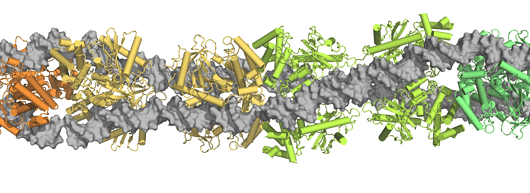New world Helicobacter pylori genome sequenced, dynamics of inflammation-related genes revealed
An international team of researchers led by scientists at the Virginia Bioinformatics Institute (VBI) at Virginia Tech have sequenced the genome of an Amerindian strain of the gastric bug Helicobacter pylori, confirming the out-of-Africa migration of this bacterial stowaway to the New World. Experiments in animals have highlighted how specific genes in the bacterial strain may be crucial to the onset of inflammation and disease.
H. pylori is a bacterium that colonizes the stomachs of over half the world's human population. Different strains of the bug have lived with, evolved and followed humans on their travels since ancient times. H. pylori is now recognized as a major risk factor in the development of stomach cancer and ulcers. However, the details of what make some strains of the bug trigger disease and others not need to be fully worked out.
Martin Blaser of the New York University Langone Medical Center, one of the authors of the study, remarked: "Most sequencing efforts for H. pylori have focused on the bacterial genomes from individuals of European descent. The new sequence information helps to redress the geographic bias of earlier work and reveals important clues about the evolution and migration of the bacterium and its human host into the New World."
To help visualize the evolutionary relationships among the different H. pylori strains, the team built a robust phylogenetic tree that helps show the evolutionary relationships among the different biological strains. The tree of life that the scientists were able to piece together reflected the major human migration out of Africa, through Asia and into the New World. Consistent with earlier findings, similarities between the genetic make-up of the Amerindian strain and the genome of a strain from East Asia suggest that the first colonizers of the New World brought H. pylori with them.
Josep Bassaganya-Riera, associate professor and leader of the Nutritional Immunology Group at the Virginia Bioinformatics Institute at Virginia Tech, senior author on the paper, commented: "In addition to building a picture of the H. pylori genome, we have been trying to find out what features of the Amerindian strain of H. pylori might be responsible for the low incidence of gastric cancer and other related conditions that have been reported in some geographic areas, including parts of South America. Our experiments show that a cytotoxin-associated gene known as cagA is essential to induce inflammation." He added: "Further experiments in mice have revealed that an unusual arrangement of these inflammation-related genes are lost when the organism interacts with its host in the stomach, which may explain the low incidence of gastric cancer and peptic ulcers in some populations of the New World. Further experiments are in progress to establish the causality of these observations and to develop computational and mathematical models of immune responses to H. pylori ."
The scientists hope to use the insights gained from the analysis of the H. pylori genome to help in the development of diagnostic tools and therapies for inflammation-related diseases and conditions.
Original publication: Mane SP, Dominguez-Bello MG, Blaser MJ, Sobral BW, Hontecillas R, Skoneczka J, Mohapatra SK, Crasta OR, Evans C, Modise T, Shallom S, Shukla M, Varon C, Mégraud F, Maldonado-Contreras AL, Williams KP, Bassaganya-Riera J.; "Host-Interactive Genes in Amerindian Helicobacter pylori Diverge From Their Old World Homologs and Mediate Inflammatory Responses."; Journal of Bacteriology 2010, 192(12): 3078-3092.
Most read news
Organizations
Other news from the department science

Get the life science industry in your inbox
By submitting this form you agree that LUMITOS AG will send you the newsletter(s) selected above by email. Your data will not be passed on to third parties. Your data will be stored and processed in accordance with our data protection regulations. LUMITOS may contact you by email for the purpose of advertising or market and opinion surveys. You can revoke your consent at any time without giving reasons to LUMITOS AG, Ernst-Augustin-Str. 2, 12489 Berlin, Germany or by e-mail at revoke@lumitos.com with effect for the future. In addition, each email contains a link to unsubscribe from the corresponding newsletter.
More news from our other portals
Last viewed contents
Psychoactive_drug
RICE
Category:Danish_mycologists
Mount_Elizabeth_Hospital
Theodor_Ludwig_Wilhelm_Bischoff
Malus
Ataxia
Philippine_Heart_Center
Albert_Sabin
Joannes_Actuarius























































